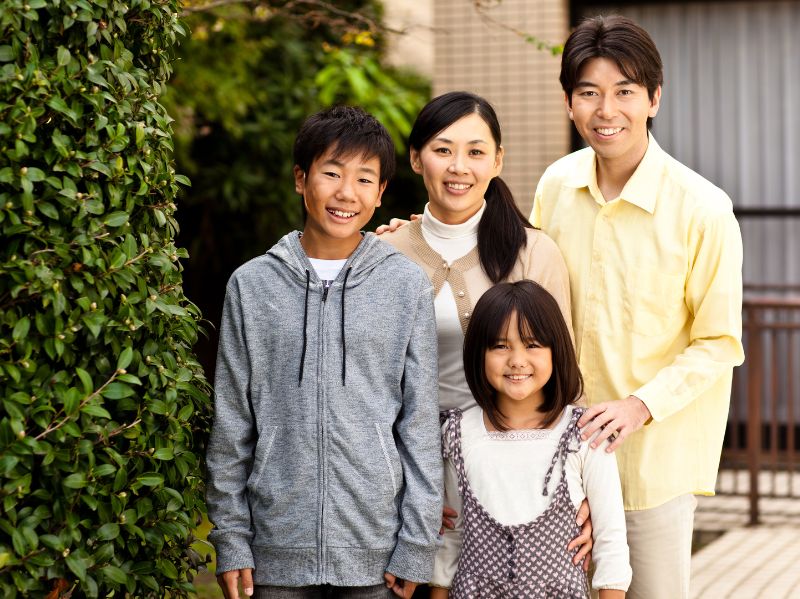|
Studying in Japan While Staying with a Host Family

I spent a year and a half living with a host family back while I was still in college before moving in with a few of my closest friends to a shared home. The best option for me to save money was by living with a host family since rent in Japan is rather costly.
The time I spent with the host family ended up being one of the highlights of my life. They never ceased to be so kind and inviting to me, and they all five treated me as if I were a member of their family. The majority of Japanese people, in my opinion, are quite timid, very private, and revere personal space, so I really didn’t anticipate them to be so open to me.
I’m still immensely grateful to the host family that welcomed me even after all these years. I will never forget the meals I had with them, the movie evenings and other get-togethers I attended, or the kindness they showed me. They played a significant role in making my first two years in Japan pleasant and in shaping who I am now. In fact, I remain in contact with them.
But undoubtedly, they are not typical of all host families. Additionally, there are both benefits and drawbacks to living in a homestay. Therefore, we’ll go through all the benefits and drawbacks of living with a host family in Japan as a student in this post.
Advantages
I can think of approximately ten benefits, if we’re talking about the host family that hosted me throughout my first few years in college. But as I just said, not all families are the same as theirs. However, there are still benefits to staying at a homestay.
Using the Language of the Area
Your ability to speak Japanese will definitely increase if you stay with a host family. The English competence of host families varies, so there’s a risk you can find up with a family that doesn’t know much of the language. Consider this a chance to practice your Japanese language abilities as you will be interacting with individuals in the neighborhood.
I can attest that this really improved my abilities. I only had rudimentary Japanese when I first arrived in Japan, but thanks to the innumerable daily discussions, I was able to speak, read, and comprehend the language within a few months. Even though I regularly bothered them with inquiries, I recall being astounded by their patience.
But in my view, even if the host family speaks your language, you should still learn the local language as a kind of respect for them for letting you live with them.
Getting Lost in the Culture
Living among the populace is the best method to understand the culture of a place. I gained a lot of knowledge about the wonderful customs and way of life in Japan not only from living with the host family but also from really spending time with them.
Simple etiquette like removing shoes before entering a home were among the most prominent. They told me to constantly slurp loudly when consuming foods like ramen to show respect for the chef. They also instructed me on the custom in Japanese homes of wearing uwabaki, or Japanese slippers, indoors.
I also have a lot of good memories from when I initially arrived in Japan. I was traveling with the son of my hosts, who was around my age. When we came across one of our senior neighbors, we were on our way to the school commute. We were in a rush, but he stopped and took the time to bow and say hello to the neighbors, and I did the same. That kind act will always make me think about the Japanese people’s humility, in my opinion.
Less Money for More
The primary factor in my decision to allow the university match me with a host family is the cost. I just had to spend around 80,000 JPY per month in my first year to reside with the host family. In my second year, the fee would rise by 3,000 JPY, but I wouldn’t have cared if it had since I was having such a great time with my host family.
Back then, when I looked up different shared homes, I saw that the prices ranged from 85,000 to 90,000 JPY. Even while these shared housing options were closer to the university than most homestays, the costs turned me off right away. And choosing to stay with the host family was a far better choice and experience when you take into account the fact that my breakfast, supper, and free internet were already included in the package.
Disadvantages
Even while I wouldn’t exchange my host family experience for everything, there are certain drawbacks to living with a family as well.
Inadequate Privacy
There are going to be occasions when you wish you had more privacy just because you are living in another nation and under another family’s roof. Living under another family’s roof requires you to share accommodations and abide by their set of household regulations. You must show consideration for the family, take care not to upset them, and observe their traditions.
I used to carry my phone into the bathtub at home and listen to music as I took a bath. They didn’t expressly mention anything about playing music when I moved in with my host family, but I understood I had to be respectful and keep noise to a minimal.
For me, the lack of privacy was a minor issue since I had my own space to accomplish the things I wanted to do on my own. Given how much Japanese people value their privacy, every homestay will definitely provide each student a private bedroom. A homestay is not for you, though, if you dislike being unable to wander about the house in your undies in the early morning hours while looking for food in the refrigerator.
Transportation
As a student, getting about will be a small inconvenience since the majority of Japanese families don’t reside in the city’s core, where most schools are. You will undoubtedly need to get accustomed to taking the train to and from school if you want to stay with a host family.
I used to travel the train twice a day back then. One to go to the college and one to return home. I spent an hour on every rail travel. While I was still a student, I didn’t particularly mind this, although there were instances when I wanted to hang out with some of my classmates but couldn’t because I had to be to the train on time. Living at a homestay may thus make it harder for you to explore the city and socialize with your friends.
Conclusion
I was so fortunate that everything came together so that I could be hosted by the nicest host family imaginable. Even though I had a wonderful experience, not everyone will feel the same way since a variety of circumstances are at play, which could be a deal-breaker for others. Living at a homestay has drawbacks, but only you can decide whether you are willing to put up with the experience.
We hope you will find this essay about living with a host family to be educational. We hope you soon locate a fantastic homestay!






